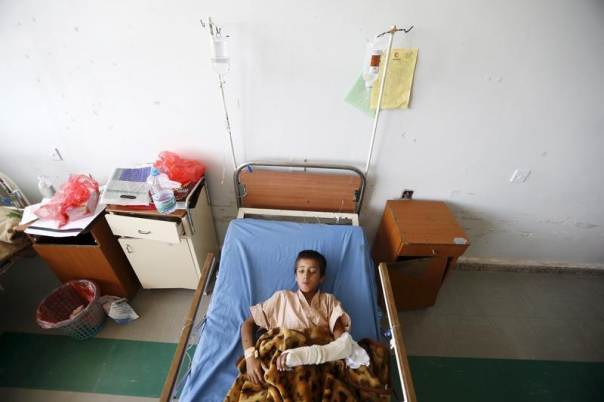
’British Doctor in Northern Yemen Unfazed by Crazy Warfare’- Thomson Reuters Foundation
Windows shattered next to Natalie Roberts as air strikes rained down around a hospital in northwest Yemen, but the British doctor focused only on keeping her war-wounded patients alive while the warplanes circled overhead.
"You feel totally isolated and unsafe, but all you can do is try to stabilize the people and children who arrive with major injuries," said Roberts, emergency co-ordinator for northern Yemen for the medical charity Médecins Sans Frontières [MSF].
Roberts spent two months in the northwestern Saada and Amran provinces, where she said air strikes had shut down most health facilities, forced medical staff to flee and damaged roads, leaving the sick and injured stranded and unable to seek help.
Nearly half of Yemen’s health facilities have closed down and there are shortages of medicines, trauma kits and blood bank supplies amid a deepening humanitarian crisis across the country, the World Health Organization [WHO] said last week.
A Saudi-led coalition has been bombarding...Houthi fighters - Yemen’s dominant force - since late March in a bid to fend off what they say is Iranian influence in the country and to reinstate exiled President Abd-Rabbu Mansour Hadi.
The southwestern city of Taiz is the latest front line in the five-month war, and little information from Saada - one of the poorest, most isolated areas in Yemen - and other northern regions has reached the outside world due to border clashes and the destruction of communication networks.
"There is crazy warfare in the north that no one knows about ... when I arrived, health facilities weren’t functioning any more - it felt like the health system had completely collapsed," Roberts told the Thomson Reuters Foundation.
"RESIGNED TO THEIR FATE"
Access to facilities and treatment was one of the biggest challenges in northern Yemen, so Roberts set up a makeshift ambulance service, renting minibuses and covering them with logos to transport people to hospitals in Saada and Amran.
"It was difficult to establish because even ambulances were rumored to be targets of air strikes so people did not initially want to be part of the service," she said.
The medical charity has also given medicines and training to staff in rural health facilities, which had shut down, to enable them to stabilize casualties and ensure they survive the ambulance journey to the region’s hospitals.
While saving lives is MSF’s priority for those in mountainous Saada province, many of whom are hiding in caves, Roberts said the mental health of displaced people living in camps and schools around Amran was also a concern.
"There are people who are unsure if they will ever be able to go back, or whether they will even have a home to return to.
"People have become resigned to their fate. The mood is one of constant terror and fear - people aren’t living but just hiding and trying to survive," she said.
Two Red Cross employees were shot dead in Amran by an unknown attacker on Wednesday, the aid group said, in a rare case of violence against humanitarian workers in a war which has killed more than 4,500 people, but Roberts said she was undeterred by the danger of working in Yemen.
"When you go to a health facility that is not functioning at all and get it up and running in a week - you realize then that people would have died otherwise.
"It’s at times like that, I think to myself: ’If I wasn’t here, who else would be’?"
